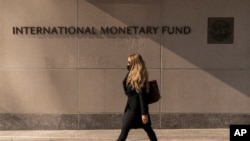The global economy is recovering faster than expected from the coronavirus pandemic, the International Monetary Fund (IMF) said Tuesday.
The IMF said the world economy is now expected to grow by 6% this year and advance another 4.4% in 2022, sharp increases from the 3.3% decline last year during the worst months of the pandemic that spread across the globe after originating in China in late 2019.
Chief IMF economist Gita Gopinath said in Washington that the improved economic outlook “reflects the additional fiscal support provided in the United States, vaccination efforts that are going to lead to a strengthening of recovery in the second half of this year, and also the continued resilience of economic activity to the pandemic in many parts of the world.”
The U.S. reported last week it added 916,000 more jobs in March. On Tuesday, the Labor Department said U.S. job openings rose to a two-year high in February, 5.1% above their pre-pandemic level.
Job openings, a measure of labor demand, increased 268,000 to 7.4 million as of February 28.
But Gopinath stressed there still is a high degree of uncertainty in the IMF’s projections because the pandemic has yet to be defeated, and the number of virus cases is accelerating in many countries.
There are varying recoveries across borders into different countries and within individual countries. The IMF said “economies with slower vaccine rollout, more limited policy support and more reliant on tourism do less well.”
Gopinath said, “The biggest risk right now is still the pandemic. If there are new virus variants that evade the vaccine, then that could lead to a sharp downgrade. But if, on the other hand, there's faster rollout of vaccinations, then that could uplift the outlook.”
She said the “the second big risk is to financial conditions. We see multispeed recoveries, and we have seen interest rates go up. If interest rates go up even further in a more disorderly fashion, then that could have negative implications for several countries, especially for some highly vulnerable emerging and developing economies.”
Gopinath, an Indian-American economist, said government officials, as has been the case in the U.S., will need to continue supporting their economies with aid that will likely lead to higher debt levels than prior to the pandemic. Better economically targeted measures are particularly important, she said, and might be needed for a prolonged period.
“Given that we are not out of the woods, it is very important for policy support to be continued in this crisis,” she said. “Of course, countries are dealing with high debt levels, so they'll have to make sure this support is better targeted and well-tailored to countries’ specific economic conditions, the stage of the recovery they are in and the structural characteristics of the economy.”
Gopinath urged central banks to “remain accommodative” in providing extra money for their national economies.




